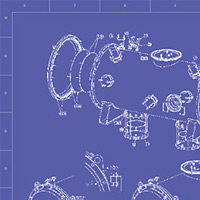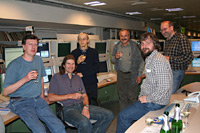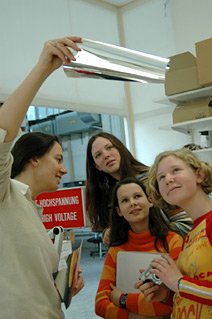 |
|
|
 |
Contracts, Costing and
Bid-to-Host – Oh My!

Assembly drawing of a test cryostat for superconducting RF cavities (Image: Clark Reid, Mayling Wong, and Valeri Polubotko)
|
Contracts, costing estimates and the bid-to-host process were the buzz words at the Linear Collider Forum of America industry meeting, hosted by SLAC earlier this week on 1-2 May. While the majority of the two days was dedicated to presentations about the latest ILC activities, this second meeting of the LCFOA allowed U.S. industry members to establish a stronger dialogue with the U.S. laboratories involved in the project. And even though the big questions about how much will it cost and when can proposals for contracts be submitted remain unanswered for the time being, attendees received a clear message that working with industry is essential for building the ILC.
"Vision is really the key element in bringing major scientific discoveries, and the ILC is a visionary project," said SLAC Director Jonathan Dorfan in a welcoming address to the industry representatives. "It is a major technological effort and also visionary in the way that it is being put together as a partnership of the labs around the world and of course involving industries around the world. Industry must get involved now, and this meeting is very timely because the interface is crucial. We cannot realise this dream without you, and we look forward to many, many years in this adventure. It’s a fantastic vision and welcome aboard."
Read more...
-- Elizabeth Clements
|
 |
|
|
 |
Upcoming meetings, conferences, workshops
HEP Forum
Cosener's House, UK
6-7 May 2006
European GDE meeting
DESY
10 May 2006 (16:00)
ILC positron source meeting
Budker Institute of Nuclear Physics
BINP, Novosibirk, Russia
10-12 May 2006
Electron Accelerator R&D for the Energy Frontier
LAL Orsay, France
15-17 May 2006
International Accelerator School for Linear Colliders
Sokendai, Graduate School for Advanced Studies
Hayama, Japan
19-27 May 2006
InterAction Meeting on ILC
KEK
29-30 May 2006
ILC Communicators Meeting
KEK
31 May 2006
ILC VTX Workshop at Ringberg
Ringberg Castle, Lake Tegernsee, Germany
28-31 May 2006
Second ATF2 Project Meeting
Japan
30 May-1 June 2006
Second Polarized RF Gun Meeting
SLAC
5 June 2006
CALOR 2006
12th International Conference on Calorimetry in High Energy Physics
Chicago, USA
5-9 June 2006
EPAC '06
Edinburgh, UK
26-30 June 2006
Vancouver Linear Collider Workshop
Vancouver, Canada
19-22 July 2006
ILC GDE Meeting
Vancouver, Canada
19-22 July 2006
View Full Calendar...
|
|
 |
 |
|
|
 |
Unprecedented: 13.1 nm for FLASH!
Shortest wavelength generated with DESY's pilot facility for the future European XFEL

It's a wavelength! DESY celebrates its FLASH success. |
When Albrecht Wagner, Chairman of the DESY Directorate, opened his mailbox in the morning of 27 April and found an email about FLASH’s 13.1-nm success, he replied immediately: "This is exciting and fantastic news! Congratulations to the entire team!" FLASH, DESY’s pilot facility for the future European XFEL, produced the shortest wavelength yet. This success was celebrated with a party in DESY’s accelerator control room the night before at 22:10 h. Already after three hours, when the superconducting TESLA Test Facility Linac, equipped with five accelerator modules, reached the designated energy of 700 MeV, the electron bunches that traversed the undulator emitted laser flashes with a wavelength of only 13.1 nm (there’s a plot from the logbook for those who don’t believe it). This is an important step on the way to reach the design value of 6 nm planned for the FLASH facility. With the sixth module which will be installed in the second quarter of 2007, it will be possible to accelerate the electron bunches to 1 GeV and to generate wavelengths of 6 nm.
Read more... -- Petra Folkerts, DESY PR/FEL
|
 |
|
|
 |
From Interactions.org
2 May 2006
The Revolution in 21st Century Particle Physics - Brian Greene talks to Congress
"Renowned physicist and author Brian Greene will address the Congressional Research and Development Caucus Advisory Committee at 3:00 to 4:30 p.m. Tuesday, May 9, in the Cannon Caucus Room, 345 Cannon, Washington, D.C. The event is hosted by House Science Committee members, Rep. Judy Biggert and Rep. Rush Holt..."
Read more...
From China View
29 April 2006
Experts worry US may lose leadership in particle physics
"Physics in the United States is in a crisis that the country may lose the leadership in basic particle research in coming years, a report of the National Research Council warned..."
Read more...
From The Economist
27 April 2006
Particle Physics in America
"NEAR Waxahachie in Texas, there is a hole in the ground. Not just any old hole. This one is almost 23km long and curves in what would be, if it were extended, a circular loop..."
Read more...
(Paid Subscription Required)
|
 |
|
|
 |
Register for the Vancouver Linear Collider Workshop
On behalf of the ALCPG and GDE, the Local Organising Committee of the Vancouver Linear Collider Workshop, invites you to the July 2006 joint meeting of the American Linear Collider Physics Group and the International Linear Collider Global Design Effort - organised by TRIUMF. The workshop will be held on the Campus of the University of British Columbia in Vancouver, Canada, from Wednesday July 19 to Saturday July 22, with satellite meetings on July 18th and July 23.
More information...
ILC Related Preprints
hep-ph/0605008
30 Apr 2006
A higher dimensional explanation of the excess of Higgs-like events at CERN LEP
hep-ph/0605003
28 Apr 2006
New Physics effects in the flavor-changing neutral couplings of the Top quark
hep-ph/0604230
26 Apr 2006
LHC-ILC synergy
hep-ph/0604228
26 Apr 2006
Supersymmetry at the PLC
physics/0604200
25 Apr 2006
Improvements to the LC Muon Tracking and Identification Software
hep-ph/0604211
25 Apr 2006
Total cross sections and soft gluon resummation
|
|
 |
 |
|
|
 |
Today’s issue features a Director’s Corner from Gerry Dugan, GDE Americas Regional Director
DOE and NSF Reviewers See Progress in ILC-Americas Program;
Also Recommend Areas of Improvement

Gerry Dugan |
The first review of the US R&D program for the International Linear Collider (ILC) by the Department of Energy (DOE) and the National Science Foundation (NSF) was held at Fermilab from 4-6 April 2006. This meeting served as DOE and NSF’s primary peer review of the US portion of ILC R&D activities. The goal of the review was to evaluate the scope and quality of the accelerator research and development activities, the prioritization of activities within the budgetary advice, the planning for the next few years, the efficacy of the management of the effort by the Americas Regional Team (ART), and the integration of the US work into the global ILC effort.
DOE’s Paul Grannis chaired the review, and Jon Kotcher was the primary NSF liaison. Dixon Bogert (Fermilab), Tom Elioff (SLAC), Don Hartill (Cornell), George Mulholland (Applied Cryo Technology), Katsuobu Oide (KEK), Ferde Willeke (DESY), and Ilan Ben-Zvi (BNL) also participated as consultants on the review committee. There were also observers from Europe and Asia.
The review began with a description of the ART organisation in the context of the ILC GDE, an overview of FY06 activities, and an outline of the requested ART activities for FY07. Subsequent presentations described US participation in the ILC Reference Design Report (RDR) and cost estimate. FY06 US R&D efforts in electron and positron sources, damping rings, main linac cavities, cryomodules, and RF systems, and beam delivery systems, were covered by speakers from ANL, Fermilab, and SLAC. On the second day of the review, presenters described US test facility plans, and the US role in international test facilities, as well as civil engineering in support of the RDR, and studies of machine operations. Although the majority of the work described is being carried out at national laboratories, university accelerator R&D projects were also included. The complete set of presentations can be found online.
At the oral closeout of the review on 6 April, the consultants reported on their impressions of the program, and provided comments and suggestions to the ART. The overall impression of the ILC program was quite positive. The reviewers observed that since the formation of the GDE and ART in mid-2005, substantial progress has been made in the specification of the machine, the development of the RDR, and the R&D program. They noted a number of areas, however, in which improvements could be made. Some of these areas are described below.
Read more...
-- Gerry Dugan, Americas Regional Director
Director's Corner Archive
|
 |
|
|
 |
|

More than 100 girls crowded around accelerating cavities, inspected
scintillating fibres, soldered plates, looked over the shoulder of
theorists and even wrote their own issue of newsline at DESY on
Thursday 27 April. It was Girls' Day - a German-wide events that
attracts more than 120 000 girls every year. Boys are excluded when the
girls between 12 and 17 explore technical and scientific professions
that are traditionally regarded as male areas. If you speak German,
find out what they think of the event in their special NewsLine
issue!
|
|

